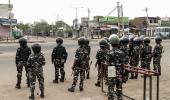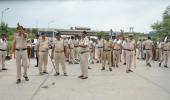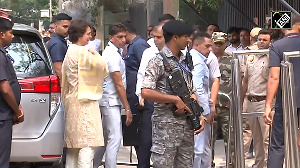'The situation in Nuh could have easily returned to normalcy if the trader class wished so but they didn't.'

Saif ul Islam, one of the advocate-members of the Association for Protection of Civil Rights, who visited the riot-affected areas of Mewat for two-and-a-half days, tells Prasanna D Zore/Rediff.com about what he and other members of the APCR team discovered in the region which saw communal violence for the first time in many years at the end of the 84 Kos Parikrama Yatra which began July 4 with the onset of the month of Shravan in north India.
APCR, established in 2006, works for the protection of human rights of the deprived sections of society and include members who are advocates, journalists and social and human rights activists.
- PART 1: 'People are scared to go to a police station'
- PART 2: 'Muslims from Nuh have escaped to Rajasthan'
According to locals in Nuh, both Hindus and Muslims, it is the migrant traders in Nuh who are creating the problem. The (Hindu) Jats and Gujjars of Nuh would never engage into a fight with the Muslims in this region because of the economic relationships forged together for centuries between the communities.
The Gujjar women, whose main occupation is cutting grass from the mountains, sell it to the Muslims who need the grass to feed their cattle. This is just one example of economic dependence shared between Muslims, Jats and Gujjars in this belt.
The traders have become very influential in this belt so much so that even when the police announce relaxation of curfew for two hours, the trading community ensure that none of them opened their shutters, thereby making it almost impossible for other establishments and shops in Nuh's main market near the bus stand to do so for the fear of reprisals from the traders who dominate the markets.
Since the traders didn't open their shops, the OBCs who have shops didn't dare to do so; the Muslim shop owners have no choice in such a scenario but to shutter down. This has created an environment of fear, insecurity and tension.
This trading community, which is financially very sound, which also earns interest money as lenders, having as many as 100 shops know they will not feel any financial pinch even if they keep their shops shut for a fortnight or more.
The situation will never return to normal unless the traders here open their shops.
The local administration is trying to bring normalcy back, but without the traders opening their shops nobody is daring to go out against them. The Gujjars and Jats, who I met and own establishments in this market, told me this.
The Gujjars and Jats in Haryana may vote for the BJP, but they are not inherently communal given their shared economic and social relationships with the Muslims in this belt. I have been working in the field in this area since last three years but never did they betray any communal feelings.
Everybody wants to open their shops in the Nuh market, but can't dare act against the wishes of the trading community there.
Many of these people are daily wage earners who earn anywhere between Rs 200 and Rs 300 and are the worst sufferers of this communal violence.
What Nuh's Common People Say

The Hindus say that the Muslims in Nuh were angry over the murders of Junaid and Nasir. The common Muslims fear that they will be harassed and hounded if they go out to open their shops. Because of this fear the poor people of Nuh, the workers and labourers, are struggling to make ends meet.
Many of the construction workers from Nuh who work in the construction sector in Gurgaon and other urban centres nearby are finding it difficult to earn daily wages. The construction sites have been closed for almost a week now and these workers have now lost as many as Rs 2,000 worth of wages during this period.
Mewat never saw Hindu-Muslim clashes. That (though the riots took place this time in 2023 the relationship between Nuh's Hindus and Muslims) has still not changed.
The locals strongly feel that the BJP is using the trader class in Nuh to sow communal discord between Muslims and Hindus in the Mewat region. This is also being witnessed in Palwal and Firozpur Jhirka, adjoining Nuh.
The situation in Nuh could have easily returned to normalcy if the trader class wished so, but they didn't.
Kindly Note: All photographs were shot only after taking consent of the people seen in the photographs.











 © 2025
© 2025